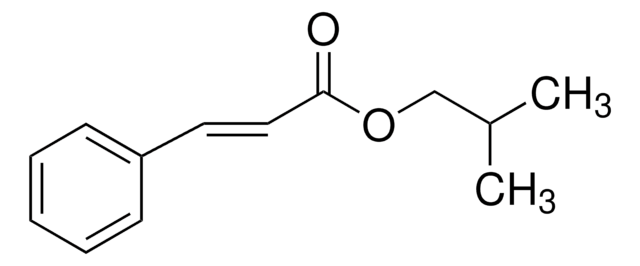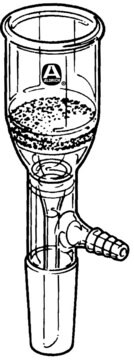W256230
trans-2-Hexen-1-ol
natural, 97%, FG
Synonym(s):
(E)-2-Hexen-1-ol
About This Item
Fragrance grade
Halal
Kosher
natural
Recommended Products
grade
FG
Fragrance grade
Halal
Kosher
natural
Agency
follows IFRA guidelines
reg. compliance
EU Regulation 1223/2009
EU Regulation 1334/2008 & 178/2002
FDA 21 CFR 117
Assay
97%
refractive index
n20/D 1.438 (lit.)
bp
158-160 °C (lit.)
density
0.849 g/mL at 25 °C (lit.)
application(s)
flavors and fragrances
Documentation
see Safety & Documentation for available documents
food allergen
no known allergens
fragrance allergen
no known allergens
Organoleptic
fresh; grassy; green; leafy
SMILES string
[H]\C(CO)=C(\[H])CCC
InChI
1S/C6H12O/c1-2-3-4-5-6-7/h4-5,7H,2-3,6H2,1H3/b5-4+
InChI key
ZCHHRLHTBGRGOT-SNAWJCMRSA-N
Looking for similar products? Visit Product Comparison Guide
Other Notes
Signal Word
Warning
Hazard Statements
Precautionary Statements
Hazard Classifications
Flam. Liq. 3
Storage Class Code
3 - Flammable liquids
WGK
WGK 2
Flash Point(F)
129.2 °F - closed cup
Flash Point(C)
54 °C - closed cup
Choose from one of the most recent versions:
Already Own This Product?
Find documentation for the products that you have recently purchased in the Document Library.
Related Content
The F&F industry continues to adapt and evolve as new consumer trends and advancements in technology emerge. Let’s take a closer look at how digitization, genderless scents, naturals and clean labels are influencing how new formulations for the flavor and fragrance market are being developed.
Our team of scientists has experience in all areas of research including Life Science, Material Science, Chemical Synthesis, Chromatography, Analytical and many others.
Contact Technical Service![1-METHYL-2-[1-(2-METHYLPHENYL)VINYL]BENZENE AldrichCPR](/deepweb/assets/sigmaaldrich/product/structures/264/326/1603b284-fc44-4a8d-95b0-6fd2fec0a19b/640/1603b284-fc44-4a8d-95b0-6fd2fec0a19b.png)
![1-METHYL-4-[1-(4-METHYLPHENYL)VINYL]BENZENE AldrichCPR](/deepweb/assets/sigmaaldrich/product/structures/413/183/71bb24e3-bc94-4dd1-9f74-63583773a435/640/71bb24e3-bc94-4dd1-9f74-63583773a435.png)







